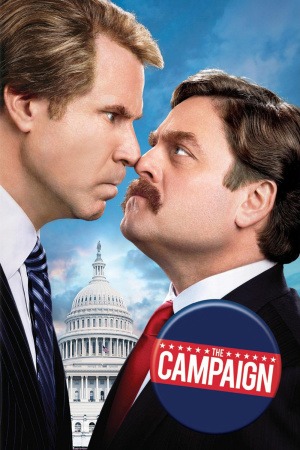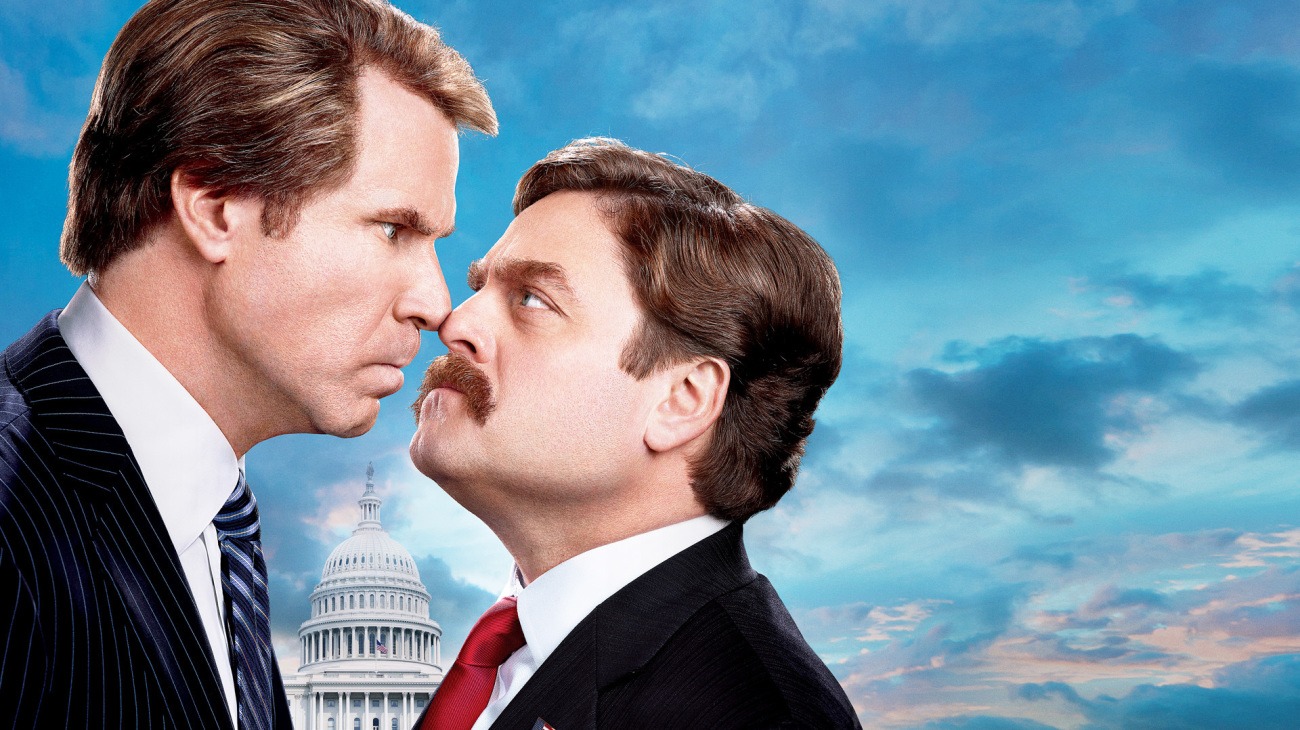
Hollywood Century, 2012: In which we dabble in politics
Politics and commercial American cinema rarely have ever played together nicely. There was a long stretch during the Depression,* when Franklin Delano Roosevelt was adored in ways that no nationally significant politician has been since the Vietnam War started, and it was generally safe to make movies that openly talked about and engaged with Democratic ideas; there was, much later and for entirely different reasons, a run in the 1970s when most everyone was so disgusted and disillusioned with everything that nihilistic political tales and thrillers became big business. But the one great truism of commercial American cinema is that it's, well, commercial: it needs to turn a profit and that means it needs to appeal to a lot of people, and staking out a real position is a great way to not do that. And so, outside of a tendency to suggest that Democrats are pie-in-the-sky dreamers and Republicans are crabby pragmatists (and also far likelier to be old, white, and male), mainstream movies do their very best, for the most part, to avoid specifics: the political world is okay to talk about, but only in the vaguest possible way. Consider, if you will, the most legendary of all American political films, Mr. Smith Goes to Washington, the movie so righteously enraged about the state of politics that Congress tried to bury it. And while you're considering it, tell me what real-world situation it speaks to, because I think you'll find it actually doesn't. Or hell, just tell me, without referring to the personal beliefs of the men involved in making it, what party Mr. Smith belongs to, because I think you'll find you can't do that, either.†
That's a situation that only entrenched itself as time has gone by, international markets have become a more essential part of the Hollywood financial landscape, and domestic audiences have grown more intolerant of actually thinking about politics. And that's part of what makes 2012's The Campaign so incredibly damn peculiar: it's a film that absolutely knows what the political landscape of that year's election cycle looked like, and its plot engine demands specific awareness of the difference between Democrats and Republicans - even the particularities of being a moderate-to-conservative Democrat who has managed to hang on to an incumbent seat in what ought to be, by all rights, a Republican-leaning district. That such a movie would be made and given a wide release that took in a solid pile of money is unexpected enough; but The Campaign goes even weirder, in that it's a Will Ferrell vehicle with Zach Galifianakis on co-lead duty. And even by the standards of mainstream comedy, Ferrell's filmography is studded with the kind of broadly absurd nonsense that suggests a fanbase particularly disinterested in honest-to-Christ political satire, which is exactly that The Campaign ends up delivering. The enormous gap between the two registers of "Ferrell comedy" and "satiric takedown of the corrosive effects of corporate money in American elections, with some particularly hard thoughts for the Citizens United Supreme Court decision" is one that The Campaign ultimately can't resolve, but watching it try is vastly more intriguing than it has any right to be. If only Kathryn Bigelow hadn't directed Zero Dark Thirty and raised all sorts of ambiguous questions about America's use of torture in the 21st Century, it would be a shoo-in for being the most politically alert movie of the year. Not what one expects for a film where Galifianakis patiently listens to his son describe his nascent fascination with bestiality.
The actual content of the film suggests itself from even the sparest logline: Ferrell is Cam Brady, a four-term Democratic congressman from North Carolina's home 14th district, running unopposed in the 2012 election. This makes him the perfect target when the Motch brothers, Glenn (John Lithgow), and Wade (Dan Aykroyd), need a malleable freshman in the House of Representatives to introduce a criminally awful bill they want to open the door to being even more savage in their attempts to destroy the American and Chinese working class through exploitation in the name of eking out higher profits. Their great white hope proves to be Marty Huggins (Galifianakis), the son of North Carolina political fixture Raymond Huggins (Brian Cox), a gentle and effeminate family man who can't even bring himself to say a word as dirty as "fart". Does this strangely random character trait suggest that a shockingly large number of jokes in The Campaign will involve him finding polite ways of talking around scatology and sex? Does a bear make its doo-doos in the woods?
I will not call it "subversive", since I have no desire to use this pulpit for the sole purpose of lying to you all, but there's definitely something sharper to The Campaign than meets the eye. Satire has been mixing low comedy and riled-up political observations for a very long while; look no further than the fratty sex comedy bursting at the seams of Dr. Strangelove for proof. Clearly, The Campaign in its single brightest, most incisive moments isn't satire enough to tie Dr. Strangelove's boots, but it shuffles its dopiest jokes in with some nastily acute dissections of how politics gets done in the United States in the 2010s, in a manner that actually does make it feel kind of more potent than a more direct, intellectual satire on the same topic might do. Such is the privilege of low expectations, maybe, but it's also the merit of unpredictability.
Now, this is still a mainstream film; Ferrell's fanbase is not made up of NPR junkies, and this is above all things part of that man's "Will Ferrell takes a comically incongruous job" subgenre: Will Ferrell does the news (Anchorman), Will Ferrell is an ice dancer (Blades of Glory), Will Ferrell plays basketball in the 1970s (Semi-Pro), Will Ferrell is a licentious congressman. It all fits.
The point being, The Campaign must, at a certain point, asset itself as a Will Ferrell movie, and particularly one with Galifianakis playing a particularly weird and distressing version of his kind of stock "hugely sensitive soul who's kind of a freakish babyman" character. Eventually, it simply runs out of satire, which it never possesses in any more dangerous capacity than pipping the Koch brothers with its horrible Motches (incidentally, Lithgow and Aykroyd make for thoroughly convincing and enjoyable evil brothers). What it becomes, and this is fatal, is nice: supposing that America is basically okay, and the right guys will shake out as the victors in the fullness of time. Despite this being the polar opposite of the theme it trumpets with its early, "American democracy has been bought out and we're all fucked if sub-functioning morons like these keep getting put in charge" jokes. It is, for a time, weird and brave for a mainstream film; but a mainstream film it is.
And even when it is strongest, it is limited to being what it is: the jokes that Ferrell is shout and foul-mouthed, that Galifianakis is undersocialised, and that vividly describing sex acts is an endless fount of comic potential are omnipresent, and just as the film was sold as being that thing, so the film is. If you love that kind of thing, it's all fine, of course. I do not, myself, love it, by 2012, I had moved from my "this Galifianakis fellow is a breath of fresh, if bizarre, air in the blandly over-exaggerated world of American comedy" phase to my " fucking motherfucker Zach Galifiankis, why don't he and his beard just fall into the sun already" phase, and The Campaign does not strongly argue against that position. But even not loving this kind of thing, I was unexpectedly satisfied by larger parts of the movie than I'd have ever anticipated. Not enough to declare it a future classic in waiting; not even enough to call it actively "good" on a binary scale of quality. But it has its compensations and it even has something like a brain with awareness of the world outside the film, and that is too rare of a commodity in American film comedy in the 2010s.
Elsewhere in American cinema in 2012
-Steven Soderbergh sneaks a fable about life during a recession into mainstream theaters pretending to be making a beefcake epic starring Channing Tatum as Magic Mike
-Yeah, superhero movies were already a license to print money, but it wasn't until The Avengers that we found out just how much money
-Andrew Stanton and Disney incorrectly estimate the mass popularity of Edgar Rice Burrough's 100-year-old pulp hero John Carter
Elsewhere in world cinema in 2012
-Pablo Larraín demonstrates that you can make a drama about real-life politics and the advertising industry actually delightful with the Chilean satire No
-France's Leos Carax ends a 13-year drought with the madcap tribute to make-up artists Holy Motors
-Joshua Oppenheimer travels to Indonesia on Danish and Norwegian money to make the utterly horrifying documentary The Act of Killing
Categories: comedies, hollywood century, political movies, satire, summer movies






